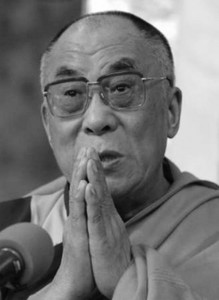DHARAMSALA, India, (Reuters) – The Dalai Lama said yesterday more and more Chinese were beginning to see a problem with Beijing’s rule over Tibet, lamenting how the homeland he fled 50 years ago had become a “hell on earth”.

Speaking before some 10,000 Tibetans from around the world, the 73-year-old slammed China for bringing “untold suffering and destruction” during a series of repressive and violent campaigns in Tibet since 1959.
“These thrust Tibetans into such depths of suffering and hardship that they literally experienced hell on earth,” he said from the main Buddhist temple in Dharamsala, the north Indian hill town where the Tibetan government-in-exile is based.
“The immediate result of these campaigns was the deaths of hundreds of thousands of Tibetans.”
China tightened security across ethnic Tibetan areas, aiming to head off potential unrest on the sensitive 50th anniversary of a failed uprising that prompted the Dalai Lama’s flight into exile in India.
Monks, who have initiated many Tibetan protests in recent years, told Reuters they were under close surveillance and riot police blocked roads and turned away foreign journalists from parts of Sichuan, Gansu and Qinghai provinces.
Later yesterday, the Dalai Lama told a news conference the voice of support for Tibet within China was rising steadily.
“More and more Chinese (are) now starting to acknowledge there is problem there,” he said. “In fact, quite a number of Chinese high officials, (their) family members (are) showing interest in Buddhism, Tibetan Buddhism.”
About 20 young men and women, dressed mostly in black Tibetan dress to mourn victims of the crackdown, came in before yesterday’s speech playing drums and bagpipes and singing “Rise up, rise up”.
The Tibetan anthem was also played and a minute’s silence was observed in the memory of victims of last year’s Chinese crackdown in Tibet.
The Dalai Lama mourned what he called the suffering and destruction wrought by Chinese Communist policies and campaigns.
Many were seen crying with folded hands as he said: “Even today, Tibetans in Tibet live in constant fear.
“Today, the religion, culture, language and identity, which successive generations of Tibetans have considered more precious than their lives, are nearing extinction. In short, the Tibetan people are regarded like criminals deserving to be put to death.”










